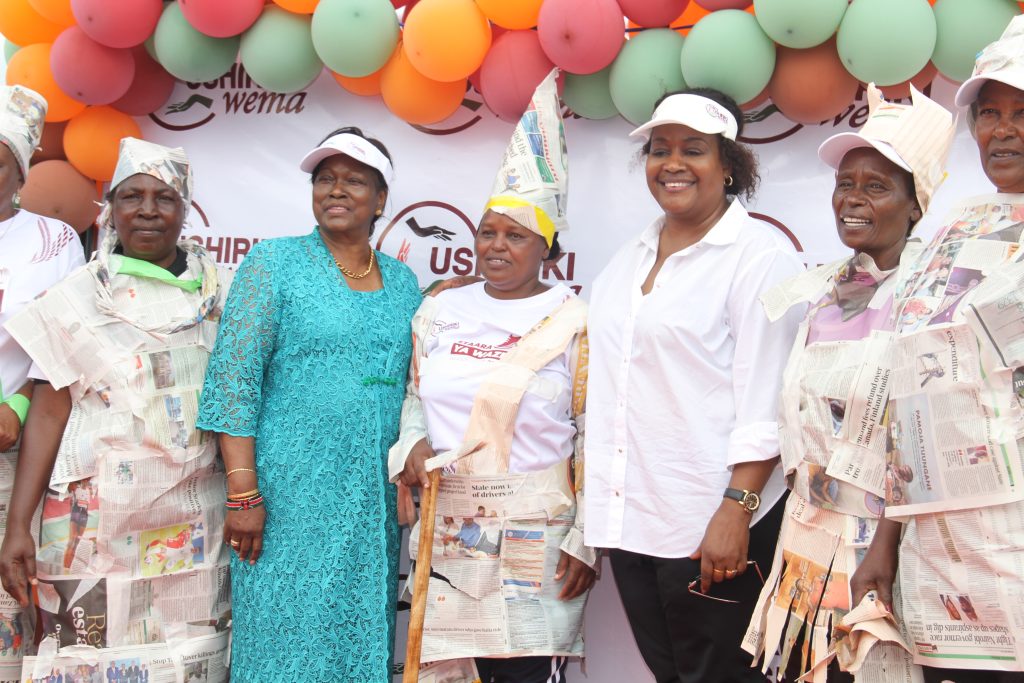Retired officers Purity Gathongo and Margaret Muthoni present an award to Kristina Pratt, who accepted the honor on behalf of her mother, former First Lady Mama Ngina Kenyatta. They are joined by Tessie Musalia, patron of the Ushiriki Wema Initiative.
By Peace Muthoka.
NAIROBI, Kenya – October 30, 2025 – The Ushiriki Wema Initiative honoured former First Lady Mama Ngina Kenyatta on Thursday for her pivotal role in integrating women into Kenya’s security forces, during an emotional ceremony that also celebrated the nation’s pioneering female veterans. The tribute, which highlighted the theme “Women in Security,” was delivered at the annual “Staara ya Wazee” sporting event at the Ulinzi Complex in Lang’ata, where calls were made for better welfare for retired servicewomen and the passage of the Older Persons Bill.
The event unveiled a little-known piece of Kenyan history: the journey began not with a public decree, but with a private conversation. Kristina Pratt, representing her mother as the chief guest, shared this intimate origin story with the audience.
“In October 1971, Mama Wetu, Her Excellency Mama Ngina Kenyatta, saw it fit to whisper,” Pratt said “You know, sometimes some of these very deep talks that a husband and wife have, they’re called a pillow talk… So, in 1971, Mama had a pillow talk with her husband, Jomo Kenyatta, and proposed that the women should also be included in the armed forces.”
That single act of advocacy led to immediate and historic action. “And in 1971, the first women were recruited into the army and into the police force,” Pratt announced to applause. “You are the pioneers. And you should be looked after very well.”
Her words resonated deeply with the rows of retired female officers in attendance, many of whom were the direct beneficiaries of that 1971 decision. However, the celebration also served as a platform for a sobering call to action. Pratt highlighted the stark realities many of these pioneers faced, revealing that the first recruits were often young, unmarried women who were discharged after just three years with no benefits or pension.
“They have no pension and they have no medical,” Pratt stated, her voice firm with conviction. “This function today is to bring it to the attention of the authorities that these issues need to be looked into.”
The event, organized by Tessie Musalia, spouse of Prime Cabinet Secretary Musalia Mudavadi, was a powerful gathering of national icons. In her opening address, Musalia directly linked the day’s celebrations to Mama Ngina’s legacy.

Former President Uhuru Kenyatta sister Kristine Kenyatta – Pratt and spouse of the Prime Cabinet Secretary Tessie Musalia with retired women in Security during “Stara ya Wazee” event organized through Tessie’s Ushiriki Wema initiative at Ulizi Sports Complex grounds in Langata in Nairobi.
“Because of your vision and advocacy, many women have served this country in uniform, fully aware that such opportunities were only once a dream,” Musalia stated. “Your actions did more than open doors; they broke barriers and lit a path for future generations.”
The audience heard testimonials from the very women who walked that path. Major General Fatuma Ahmed commended Ushiriki Wema for fostering solidarity, noting, “Our service may have ended, but our mission to build and inspire continues.”
Madam Grace Kahindi, former Deputy Inspector General of Police, recalled the early challenges of serving in male-dominated institutions. “We have moved this nation forward, and history will remember the women who first wore the uniform,” she declared.
Looking ahead, speakers offered a blueprint for an active and dignified retirement. Pratt strongly encouraged the veterans to form Savings and Credit Cooperatives (SACCOs). “Even in retirement, you still have strength, skills, and the spirit to work,” she said. “With a little support, you can build sustainable livelihoods.”
She also addressed the profound challenge of loneliness among the elderly, calling it a critical health issue. “If you’re busy, and you’re able to do your work in the community, you avoid that. That is the essence of Ushiriki Wema: unity in togetherness.”










